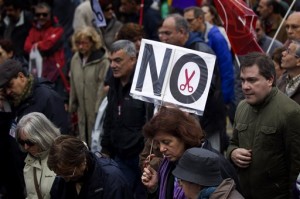
Thousands demonstrate against education and health care spending cuts in Madrid, Sunday, April 29, 2012. Tens of thousands of people across Spain are protesting education and health care spending cuts as the country slides into its second recession in three years. With unemployment at 24.4 percent – a eurozone high – and more than half of Spaniards under 25 years old jobless, Prime Minister Mariano Rajoy's conservative government has introduced stinging austerity measures in its first five months in office. AP PHOTO/DANIEL OCHOA DE OLZA
MADRID—Spain has back tipped into recession, an official estimate confirmed Monday, even as the government pressed ahead with unpopular spending cuts to rein in burgeoning debt.
Spain’s economy shrank by 0.3 percent for the second straight quarter in the first three months of 2012, according to preliminary data by the National Statistics Institute.
The return to recession, blamed on weak domestic demand only partially compensated by exports, comes barely two years after Spain emerged from the last downturn at the start of 2010.
It was no surprise coming days after an even more pessimistic diagnosis by the Bank of Spain, which predicted the economy would shrink by 0.4 percent in the first quarter.
But it was the first official estimate to confirm a recession – two quarters of shrinking economic output.
Despite the recession and a towering unemployment rate, which hit 24.4 percent in the first quarter, the government has vowed to meet its ambitious deficit-cutting targets so as to regain market confidence.
Tens of thousands of people took the streets on Sunday to protest against the conservative Popular Party’s spending cuts, however, especially in health care and education.
Across the eurozone, meanwhile, the emphasis on austerity remedies during a recession is increasingly come under question.
Investors’ doubts about Spain’s ability to meet its deficit goals are amplified by the plight of Spain’s banks, many bogged down in bad loans extended during the property boom.
Markets fear the state may have to step in to help some banks’ fragile balance sheets, placing its own deficit under further stress.
Standard & Poor’s on Monday downgraded the ratings of the top Spanish banks, including Santander and BBVA, after slashing the country’s credit standing because of the deficit and the recession.
The banks affected include Santander and its subsidiary Banesto, BBVA, Banco Sabadell, Ibercaja, Kutxabank, Banca Civica, Bankinter and the local unit of Barclays.
S&P on Friday slashed Spain’s sovereign rating by two notches to ‘BBB+’ and said Monday the same considerations “could have potentially negative implications for our view of the economic risk and industry risk affecting the Spanish banking industry.”

